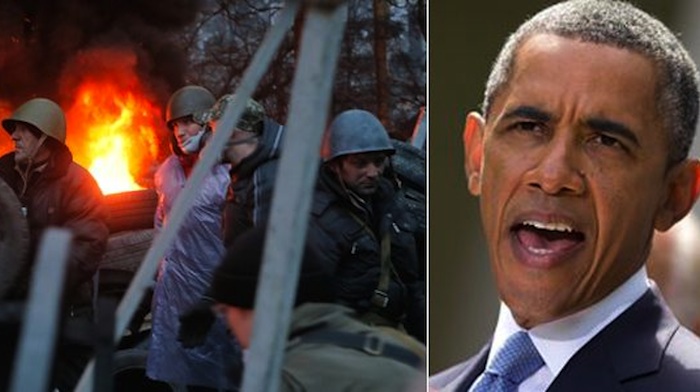

The administration said the International Monetary Fund is working on an assistance package, but last week Jay Carney said the U.S. will give Ukraine foreign aid to “strengthen its social safety net.”
Several surveys have been released since the onset of the Ukrainian crisis, and they have found there is no broad support for a Ukraine intervention by the United States.
A March 03 Rasmussen survey found Americans are evenly divided over whether the United States should try to punish the Russians diplomatically. The survey didn’t even as respondents about a military option, but judging by the weak support for economic sanctions, there seems little reason to have done so.
Rasmussen Reports found that 37 percent of likely U.S. voters think the United States should take diplomatic action if Russia gets directly involved in the political situation in Ukraine. However, just as many, or 36 percent, disagree and oppose diplomatic action against Russia, while 27 percent are not sure.
From the very beginning, whether due to the lack of coverage by the media or other factors, the American people didn’t seem to care too much about events occurring in Ukraine. An earlier survey released February 24, found there was little enthusiasm for getting involved in the Ukrainian crisis, with just 17 percent saying the United States should get more directly involved.
Looking at these poll numbers it is obvious why President Obama immediately took the military option off of the table, particularly since he is so inclined to do what is politically expedient rather than strategically correct. However, one might wonder why pollsters, and even the media for that matter, have yet to ask or cover a very important factor that Americans should know. If the idea of a Ukraine intervention is put forward, whether economical or militarily, we should be hearing the actual facts from both of these shapers of public opinion.
But, we’re not, so here they are.
In 1994, Bill Clinton, John Major, Boris Yeltsin and Leonid Kuchma – who were then-rulers of the USA, UK, Russia and Ukraine — signed the Budapest Memorandum. The treaty obligated the U.S. and U.K. toward Ukraine, because they promised to defend them against Soviet and Russian aggression, and in return Ukraine gave up its aspirations of becoming a nuclear power.
The treaty was just one part of the denuclearization of former Soviet republics after the dissolution of the Soviet Union, which begs some very serious questions. Are the American people unwilling to keep their promises? And if so, are they even aware of the dangers — both physical and psychological — that would face the U.S. if they became a nation known around the world as one who doesn’t keep their promise?
Further, as state previously, there are many of these treaties and Putin could anticipate we are unwilling to honor any of them. If so, then where does a country’s aggression end? Does that translate into more aggression by other, observing nations in other regions?
If Barack Obama and his naive foreign policy has taught us anything, then it is the answers to such questions. And it is unfortunate that Americans truly seem to be incapable of answering them.






